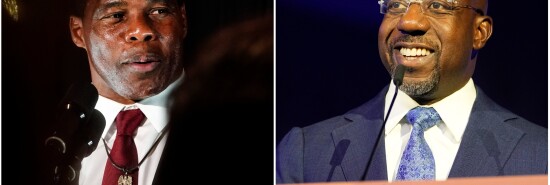
The curious case of the Kemp-Warnock voter
David Burrell
Video Embed
With the final ballots counted in Georgia, the 2022 midterm elections are officially in the rearview. Incumbent Democrat Raphael Warnock won his race convincingly with 51.4% of the vote, while football legend Herschel Walker lagged behind at 48.6%, giving Democrats a 51-49 majority in the U.S. Senate.
During the open primary last month, Warnock finished ahead of Walker by just 36,465 votes out of the nearly four million cast, with less than one percentage point separating the two as the libertarian candidate, Chase Oliver, siphoned 2.1%. In the runoff, Warnock’s margin swelled to nearly three times the size of his primary lead, carrying him to victory and affirming the media narrative waiting in the wings: in just the span of a few short years, Georgia has transformed from a “deep red” state into a proper “purple” one during federal elections.
WISHFUL THINKING? CHUCK SCHUMER PREDICTS DEMOCRATS WILL KEEP THE SENATE AGAIN IN 2024
But despite Walker’s loss, Republicans remain the dominant electoral force in Georgia, with the majority of voters self-identifying as members of the GOP. This has resulted in the Republican Party enjoying sweeping control of state politics, as they maintain significant majorities in both legislative chambers and hold every state office. It is no surprise, then, that Republican Gov. Brian Kemp, despite ongoing drama with former President Donald Trump, won reelection outright, defeating Democratic nominee and national media figure Stacey Abrams by nearly 8 points in the November primary.
What is unusual, however, is just how badly Walker performed in his U.S. Senate race in November on a ballot where Kemp commanded such a powerful lead over his own Democratic challenger. In fact, the two Republicans were separated by nearly 9 percentage points, with Kemp outscoring Walker by more than 200,000 votes.
This differential is in-line with our pre-primary-election polling that showed Kemp with significantly greater support than Herschel Walker, despite representing the same political party and its policies. Without the ability to ride Kemp’s coattails in the runoff, Walker’s odds decreased significantly based on the same forces that materialized during the primary.
To make sense of it all, consider who these margin-making voters are. According to our research, two-thirds of the Kemp-Warnock primary voters self-identify as Republicans or independents, with only 28% claiming to be Democrats. They primarily reside in urban areas or in communities adjacent to cities. Historically, these have largely been reliable voters for the GOP.
But, the same polling shows these voters overwhelmingly disapprove of former President Donald Trump, with just 35% holding a favorable view compared to 54% with an unfavorable view, a more than 18-point gap. As Georgia voters chose Joe Biden over Donald Trump in the 2020 presidential election by 0.3 points, these same Kemp-Warnock voters opted for now-President Biden by a 14-point margin. Judging by the scale of his primary victory, it’s clear both fans and detractors of the former president were willing to pull the lever for Kemp.
Our extensive study found that even if these profoundly important split-ticket voters opposed some of Kemp’s policies on controversial issues like abortion, they overwhelmingly supported his day-to-day “quality of life” policies, such as reopening Georgia before any other governor during the pandemic despite extensive blowback from the media, Democrats, and even some Republicans including then-President Trump. For these voters, the practical benefits of living in a state governed this way apparently outweighed any negative feelings they had about the governor’s “big picture” politics.
Herschel Walker could not say the same. He was plagued by seemingly endless scandals, as well as voter fears that he wasn’t suitable for the role. Kemp hoped to soothe some of these voters’ anxieties by lending his support to Walker in the form of a top-notch grassroots infrastructure and fundraising, but his popularity simply proved non-transferable.
At the same time, Warnock earned high praise for his get-out-the-vote operation, fundraising prowess, and, despite holding well-documented progressive policy positions, his reputation as an ideologically dispassionate lawmaker more committed to serving the needs of Georgians than those of Senate Majority Leader Chuck Schumer (D-NY). Our polling showed that not only did these split-ticket Kemp-Warnock voters strongly disapprove of Walker, but they also seemed to really like Warnock, with 71% holding a favorable view of him. With greater motivations than simply stopping Walker, Warnock could rely upon more than Walker’s “candidate quality issues” to motivate voters to turn up for the runoff.
This was especially important because Walker embarked on the runoff with a built-in advantage: there are more Republicans than Democrats in Georgia. Yet, day after day, Warnock deftly chipped away at Walker’s implied margin, even overcoming the enthusiasm gap among reliably Democratic voters from the absence of Stacey Abrams, an activist organizer with a major national profile, at the top of the ticket in December.
CLICK HERE TO READ MORE FROM THE WASHINGTON EXAMINER
In the months ahead, Republican postmortem analyses will attempt to answer how, even in a prime political environment for the GOP, things could go so wrong for them this cycle. Experts and pundits will argue about how and when people voted, platform and messaging strategies, candidate quality, fundraising tactics, and a great deal more. They’ll also need to grapple with the role that former President Donald Trump played in candidate selection in the primaries, as well as how his presence as a force within the party affects both turnout and its ability to attract voters outside of its most hardcore constituencies.
While Georgia is not alone in this split-ticket phenomenon, the results in the Peach State provide perhaps the best glimpse into the disposition of voters that both parties need to win elections. Whichever party understands them best and offers them the candidates and solutions they want could have the key to future electoral successes.
David Burrell is the CEO of Wick Insights, an Atlanta-based national polling firm.
